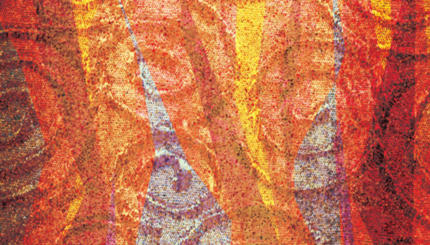Reprinted with permission of the Jewish Theological Seminary.
This week’s parashah finds the Israelites routing the Midianites. The victory is total; the five kings of Midian and all their male subjects meet their death. The Torah appears to go out of its way to inform us that the Israelites "also put Balaam son of Beor to the sword" (31:8). It is a passing detail that triggered the rabbinic imagination. The narrative fragments which constitute the interaction of this pagan prophet with the fate of Israel seem little more than dots waiting to be connected midrashically. A form of reader participation, midrash embellishes the spare story line of Torah narrative. In the process, it tends to give the material a refreshingly moral twist.
Two questions prick the Rabbis: Why does Balaam merit death? And why by the sword? The end of the story takes us back to the beginning. According to the midrash, the fear of an ascendant Israel brought the traditional enemies of Moab and Midian to bury the hatchet and forge an alliance. Given that Moses had lived among the Midianites, indeed found his wife in their midst, Balak, the king of Moab, inquired of Midian as to the secret of his strength. When they responded that "his strength resided in his mouth," that is, his ability to communicate with God, Balak decided to attack them with their own weapon. Hence, the recourse to Balaam, Midian’s renown sorcerer, to employ words as weapons in cursing Israel (Rashi on 22:4).
To our first question, then, the Rabbis offer two answers. First, punishment is visited upon Balaam for his intentions rather than his deeds. In truth, God frustrated his design. The beauty of Israel paralyzed his powers to curse. Only words of blessing were forthcoming. Nevertheless, he had come to harm and what counts in the exacting scales of divine justice is not the spin we give to our actions but their inner motivation (Torah Shlemah, Mattot, ch. 31, no. 55).
With your help, My Jewish Learning can provide endless opportunities for learning, connection and discovery.
The second answer posits a still darker portrait of Balaam. Having failed to curse, he conspires to harm Israel with another stratagem. He advises Barak to have his young women seduce the men of Israel. Passion leads to apostasy. The worship of Baal-peor included sexual orgies (25:3). The ensuing eruption of God’s wrath cost Israel some 24,000 casualties.
Adding insult to injury, Balaam demanded to be rewarded for the success of his devious counsel. That is the reason he is to be found among the kings of Midian when he is slain. He sought recompense for each one of the 24,000 Israelites who fell at Baal-peor. Like the camel that insists on horns, only to have its ears cut off, Balaam pays dearly for overreaching (Babylonian Talmud, Sanhedrin 106a).
The principle at work in Balaam’s violent death is measure for measure. As he tried to employ Israel’s weapon against them by neutralizing their power of speech, Israel ended his life by turning Midian’s usual weapon of war against him and them. Death by the sword mocked Balaam’s complete impotence (Rashi on 31:8).
Much of this binary reconstruction is driven by a pervasive rabbinic conviction that Israel’s survival depends on God’s favor rather than man-made weapons. Rabbi Elazar ben Shamma, a witness of the Hadrianic persecution and a disciple of the martyred Rabbi Akiva, picturesquely formulated the conviction of Israel’s uniqueness: At Mount Sinai "a book and a sword descended from heaven conjointly." What God meant to say by this set of symbols was twofold: "If you abide by this written Torah, it will protect you from the sword. If you don’t, the sword will smite you" (Sifre, Ekev, 40). That is, the word is the mightiest weapon of all.
There is a touch of irony in the depiction of Moses as a man of speech, for in his first encounter with God, he had described himself as "slow of speech and slow of tongue" (Exodus 4:10). But the point of the midrash is the potential of the human spirit to transcend the physical world. Speech in this context stands for a spiritual affinity that engenders religious experience. Through the vehicle of Torah, Israel creates an environment that softens the harshness of reality with divine meaning. Ultimately, Jews live in their head.
Jewish history attests the power of the spirit. Where are the ancient empires that decimated Samaria in 722 B.C.E., Jerusalem in 586 B.C.E. and 70 C.E., the Jewish communities of the Rhineland in 1096, Spanish Jewry in 1492 or European Jewry in the Holocaust? The vanquished long outlived their oppressors. Inestimable losses and unimaginable suffering failed to deplete the spiritual reservoir of the Jewish people. On the contrary, the vanquished survived to write the history of their losses. Memory rendered past calamities into an anguished present that never fades. And memory is the function of speech.
The 24-hour fast of Tishah b’Av celebrates the resilience of the Jewish spirit. Even as we commemorate the destruction of two Temples and other dark moments of our history, we pay tribute to the unbroken faith and indomitable will of our people. Thus rabbinic Judaism rises from the ashes of the Second Temple, the talmudic academies of Ashkenaz after the First Crusade, Lurianic kabbalah after the Spanish expulsion and the State of Israel, and the renaissance of American Judaism after the Holocaust. Mourning is the language of memory, the passage to recovery. As we move during the course of the day from lament to resolve, we affirm the primacy of the spirit in a world awash with violence.
Torah
Pronunced: TORE-uh, Origin: Hebrew, the Five Books of Moses.


